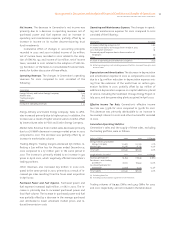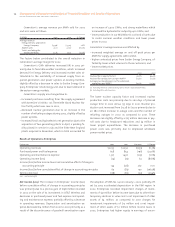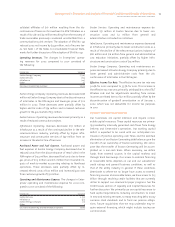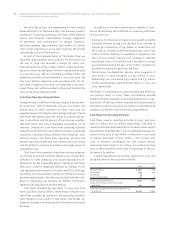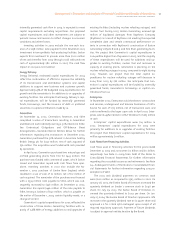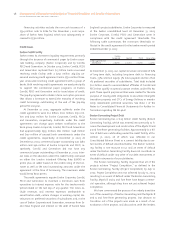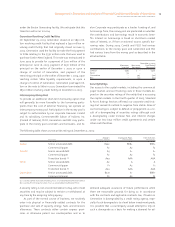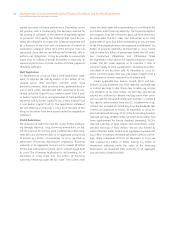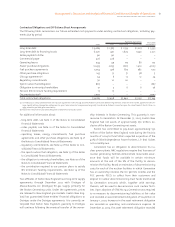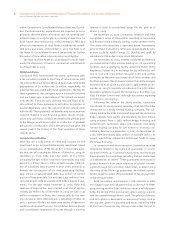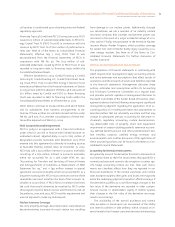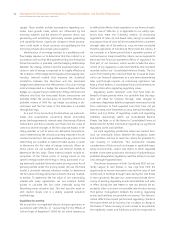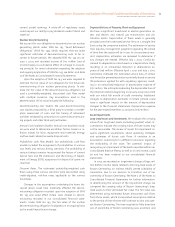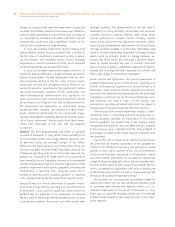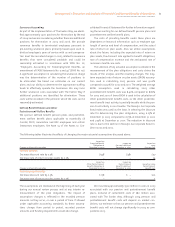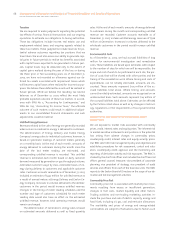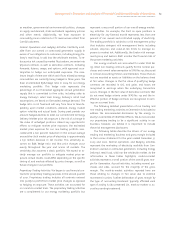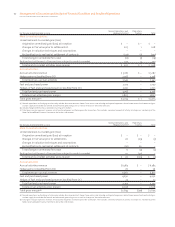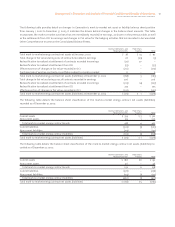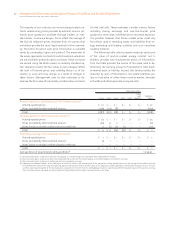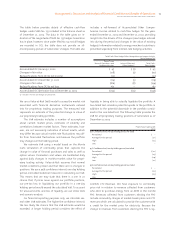ComEd 2003 Annual Report Download - page 65
Download and view the complete annual report
Please find page 65 of the 2003 ComEd annual report below. You can navigate through the pages in the report by either clicking on the pages listed below, or by using the keyword search tool below to find specific information within the annual report.63Management’s Discussion and Analysis of Financial Condition and Results of Operations
EXELON CORPORATION AND SUBSIDIARY COMPANIES
call options is conditioned upon obtaining state and Federal
regulatory approvals.
Financing Trusts of ComEd and PECO. During June 2003, PECO
issued $103 million of subordinated debentures to PECO En-
ergy Capital Trust IV (PECO Trust IV) in connection with the
issuance by PECO Trust IV of $100 million of preferred secu-
rities (see Note 16 of the Notes to Consolidated Financial
Statements). Effective July 1, 2003, PECO Trust IV was
deconsolidated from the financial statements of PECO in
conjunction with FIN No. 46. The $103 million of sub-
ordinated debentures issued by PECO to PECO Trust IV was
recorded as long-term debt to financing trusts within the
Consolidated Balance Sheets.
Effective December 31, 2003, ComEd Financing II, ComEd
Financing III, ComEd Funding, LLC, ComEd Transitional Fund-
ing Trust, PECO Trust III and PECO Energy Transition Trust
were deconsolidated from the financial statements of Exelon
in conjunction with the adoption of FIN No. 46-R. Amounts of
$6.1 billion owed by ComEd and PECO to these financing
trusts was recorded as debt to financing trusts within the
Consolidated Balance Sheets as of December 31, 2003.
Other. Exelon continues to review entities with which Exelon
and its subsidiaries have business arrangements to de-
termine if those entities are variable interest entities under
FIN No. 46-R and, if so, whether consolidation of these enti-
ties will be required as of March 31, 2004.
PECO Accounts Receivable Agreement
PECO is party to an agreement with a financial institution
under which it can sell or finance with limited recourse an
undivided interest, adjusted daily, in up to $225 million of
designated accounts receivable until November 2005. PECO
entered into this agreement to diversify its funding sources
at favorable floating interest rates. At December 31, 2003,
PECO had sold a $225 million interest in accounts receivable,
consisting of a $176 million interest in accounts receivable,
which we accounted for as a sale under SFAS No. 140,
“Accounting for Transfers and Servicing of Financial Assets
and Extinguishment of Liabilities—a Replacement of FASB
Statement No. 125,” and a $49 million interest in special
agreement accounts receivable, which we accounted for as a
long-term note payable. PECO must continue to service these
receivables and must maintain the level of the accounts re-
ceivable at $225 million. If PECO fails to maintain that level,
the cash that would otherwise be received by PECO under
this program must be held in escrow until the level is met. At
December 31, 2003 and 2002, PECO met this requirement and
was not required to make any cash deposit.
Nuclear Insurance Coverage
We carry property damage, decontamination and premature
decommissioning insurance for each station loss resulting
from damage to our nuclear plants. Additionally, through
our subsidiaries, we are a member of an industry mutual
insurance company that provides replacement power cost
insurance in the event of a major accidental outage at a nu-
clear station. Finally, we participate in the American Nuclear
Insurers Master Worker Program, which provides coverage
for worker tort claims filed for bodily injury caused by a nu-
clear energy accident. See Note 19 of the Notes to Con-
solidated Financial Statements for further discussion of
nuclear insurance.
CRITICAL ACCOUNTING POLICIES AND ESTIMATES
The preparation of financial statements in conformity with
GAAP requires that management apply accounting policies
and make estimates and assumptions that affect results of
operations and the amounts of assets and liabilities reported
in the financial statements. Management discusses these
policies, estimates and assumptions within its Accounting
and Disclosure Governance Committee on a regular basis
and provides periodic updates on management decisions to
the Audit Committee of the Exelon Board of Directors. Man-
agement believes that the following areas require significant
management judgment regarding the application of an ac-
counting policy or in making estimates and assumptions to
describe matters that are inherently uncertain and that may
change in subsequent periods: accounting for derivative in-
struments, regulatory accounting, nuclear decommission-
ing, depreciable lives of property, plant and equipment,
impairment of assets including goodwill, severance account-
ing, defined benefit pension and other postretirement wel-
fare benefits, taxation, unbilled energy revenues and
environmental costs. Further discussion of the application of
these accounting policies can be found in the Notes to Con-
solidated Financial Statements.
Accounting for Derivative Instruments
We generally account for derivative financial instruments on
our balance sheet at their fair value unless they qualify for a
normal purchases and normal sales exception or unless spe-
cific hedge accounting criteria are met. How such instru-
ments are classified affects how they are reported in our
financial statements. If the normal purchases and normal
sales exception applies, then gains and losses are recognized
when the underlying physical transaction affects earnings. If
the derivative qualifies as a cash-flow hedge, changes in the
fair value of the derivative are recorded in other compre-
hensive income in shareholders’ equity. If neither applies,
then changes in the fair value of the derivative are recog-
nized in our earnings.
The availability of the normal purchases and normal
sales exception is based upon our assessment of the ability
and intent to deliver or take delivery, which is based on in-
ternal models that forecast customer demand and electricity


